Bob McIntosh

On July 28th North American harness racing lost one of its all-time leading trainers and breeders when Canadian horseman Bob McIntosh passed away at the age of 71. TROT reached out to a handful of people that knew Bob best, and asked them to share a few memories and stories of a man who racing will dearly miss. By Chris Lomon.
On July 28, 2024, Standardbred racing lost an icon, when Canadian trainer-breeder-owner Bob McIntosh sadly passed away at the age of 71. Statistically, we could fill this entire magazine with lists of his accolades, but the 16 Breeders Crowns and the superstars he trained like Artsplace, Camluck, Odds Against, Staying Together, Thinking Out Loud and L A Delight - to name just a few - only tell part of the story. Yes, Mr. McIntosh trained 4,608 winners to $106,070,883 in purses, but he was also a leading breeder, and horses he bred, either in-whole or in-part, also won 7,838 races while accumulating $88,579,240 in purses along the way. The consummate horseman to us all, the people that knew him best, also knew him simply to be a wonderful man, so at TROT we thought we’d ask a handful of them to share a story or a memory with us, and the ones we asked were all happy to oblige.
Rest In Peace, Bob. You will truly be missed.
AL McINTOSH...
Al McIntosh was able to view the life and career of his cousin, Bob McIntosh, through a most unique lens.
Whether it was through the friendship they forged at an early age, a shared love of horses and horse racing, or the profound respect they had for one another as horsemen and individuals, the pair were nearly inseparable, both on and off the racetrack.
“Bob and I, we were together all the time since we were kids,” remembers Al. “When he started training, I think I was the first owner that actually paid a bill to him. Up until that point, he had his own horses. He started off with a one-horse stable and just grew from there.
“He wanted to be known for his horsemanship rather than just being a trainer. He did it all. I was always so proud of our horses, how fit and good they looked. Bob’s father, Jack, was a good stock man. Bob said one of the greatest compliments he ever received came from his dad, who said, ‘How do you keep those horses looking so good?’ That meant a lot to Bob.”
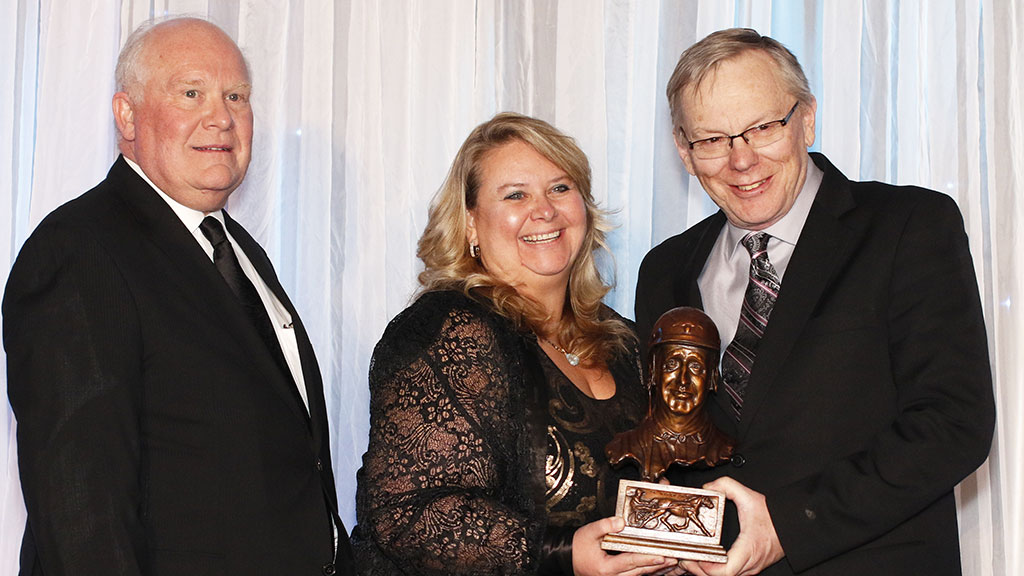
(Iron Horse Photo)
Of the many recollections he has of his cousin, it was, of all things, a certain odd look Bob once sported that first came to mind for Al.
“I was thinking about this in the days after Bob had passed. When we started out, we were in the claiming horse business. We were heading to Mohawk one night to claim a horse and I looked over at Bob, and one of the arms was missing from his glasses. We went out and claimed the horse, and I couldn’t stop looking over at Bob wearing those [crooked] glasses with only one arm on them. He knew it was missing, but he needed those glasses.”
Road trips would be a common theme for the cousins over the years.
“We travelled a lot together. We got to go to places I never thought we would get to. I remember when The Meadowlands opened, I thought, ‘I’d like to get there some day’. I just wanted to see the place once. My first trip down there with Bob, and we had a winner. I got to go to the winner’s circle, which was a special moment. Everything I ever achieved in racing I owe it to Bob.”
JOHN CAMPBELL...
When one of Standardbred racing’s all-time greats uses the word “genius” to describe your work with horses, it’s truly the ultimate compliment.
A multiple hall of fame inductee, a winner of 11,058 races and over $303 million in purses, and legendary status in the sport, are all associated with the name ‘John Campbell’.
So, when the man with a record seven Meadowlands Pace, six North America Cup and six Hambletonian triumphs delivers unprompted, lofty words of praise, it’s as meaningful as it gets.
“Bob was a genius around horses,” lauded Campbell. “That is the first thing that always comes to mind for me. It was incredible when it came to the intuitiveness he had with horses, what they needed, what would work with problem horses - he was amazing.”
McIntosh was also willing to learn from others, eagerly and respectfully embracing their knowledge.
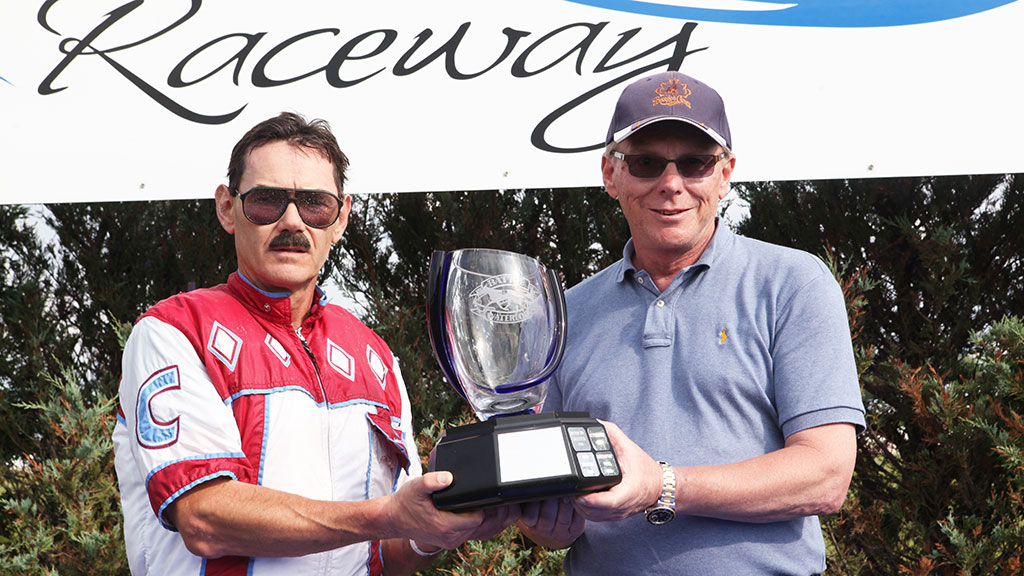
(Iron Horse Photo)
“I know he learned from people. I know that horses racing with low heads and long hobbles came from Jack Kopas. Bob talked about speaking with Clint Hodgins about shoeing for horses who would hit their knees. Even though he was a natural horseman, it was that inquisitive nature and willingness to learn from other people helped carry him throughout his career.”
McIntosh’s all-round horsemanship was known far-and-wide throughout the racing world, Campbell included.
“Beyond his training, his impact on the breeding industry throughout North America is going to be felt for generations; the horses and families he developed and bred - that is going to go on for a long, long time. He was also ahead of his time in horse nutrition. He really was that well-rounded horseman.”
Campbell was the one who drove McIntosh’s first horse, Brilliant Bonnie.
“She was nothing like the horses we have today,” recalled the driver whose seasonal purses topped the $9 million mark an astounding 18 times. “She was this hard-gaited, knucklehead of a mare. But from that mare, being his first one, and Bob still having success through to 2024 - that is absolutely amazing.”
As is Campbell’s story about his association with Brilliant Bonnie.
“Bob took great pleasure in stating to me that he was the first guy that ever fired me as a catch-driver,” chuckled Campbell, who would later team with McIntosh for dozens of memorable victories, including several with superstar pacer Artsplace. “He took me off that mare. I don’t remember that, but I’m sure he did do that (laughing).”
Even so, the ‘genius’ label he bestowed upon McIntosh remains untarnished.
“When you look at his body of work, from when he started training horses, to training top horses, right up until he passed away, it’s amazing what Bob was able to do. Horses have changed dramatically since the time Bob started, but it’s impressive how he was able to make so many adjustments and have the great success he had.”
STEVE CONDREN…
Canadian Horse Racing Hall of Fame driver Steve Condren made numerous trips to the winner’s circle with Bob McIntosh, the duo forming a formidable one-two punch over the years.
Over his distinguished and decorated career, Condren, a top reinsman in Ontario and the O’Brien Award winner as Canada’s Driver of the Year in 1997, won several of the sport’s biggest races, en route to 6,859 lifetime wins.
Driving for McIntosh, something he did for 30-plus years, continues to be a treasured highlight for the horseman whose signature score came in the 1989 North America Cup with Goalie Jeff, along with multiple Breeders Crown victories and other high-profile Grand Circuit wins.
One of Condren’s fondest remembrances of McIntosh however, has nothing to do with prominent pacers and trotters, prodigious purses, or magnificent on-track moments.
Instead, the recollection is one that still prompts some food for thought.
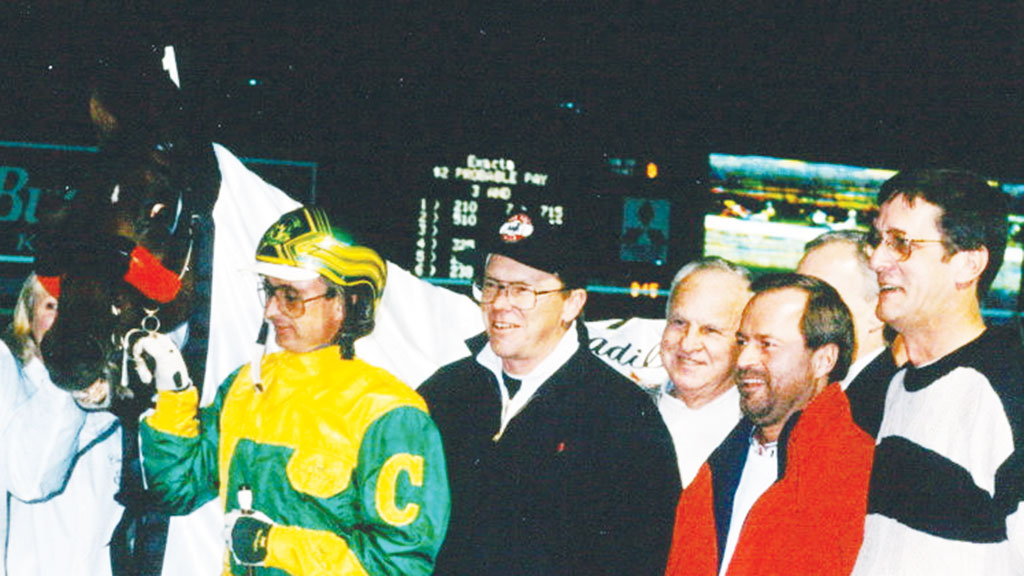
Armbro Officer - 1995 Breeders Crown (Courtesy Hambo Society)
“Everyone will have a different story about Bob, but the best one I can think of, outside of his outstanding career, is when I would come back from Florida… I would stop by and visit him at the farm and help him train a bunch of colts, and then we would go out for lunch.”
McIntosh would find himself without a certain must-have during those lunches.
“He always forgot his credit card,” shared Condren with a laugh. “Well, that’s what he said. After about the third year, I quit stopping at the farm. His mind was everywhere when he was training, to be honest; it [forgetting the credit card] was probably legit. He was the type of person that probably always forgot everything at home.
“That story would be something comical, something sweet and nice to remember him. His family and close friends would probably say, ‘That’s not the first time he’s done that’ (laughing).”
McIntosh also had a penchant for referring to younger horse people in a certain manner.
“He called a lot of people ‘Kid,’” noted Condren. “I remember one time at Woodbine, which was notoriously a tough place to win if you got away poorly, when I was driving one for Bob. I forget the trotter’s name, but I had the 10-hole in an OSS Gold final.
“Before the race, Bob said to me, ‘Whatever you do Kid, don’t get away last’. He was kind of joking, but nonetheless, we were on top by three lengths when we reached the tote board the first time and we won for fun.”
DOUG McINTOSH…
Doug McIntosh’s memories of his younger brother are, in every way, picture perfect.
Nearly 10 years separated the siblings, but a love for horses, among other things, set the foundation for a strong brotherly bond.
“Being the older one, Bob was following me around for quite some time,” recalls Doug. “He always had a passion for horses. We had ponies and I can recall him staying in the barn brushing them until my mother would holler at him to come on in.
“My dad was a dealer of horses, and we had several breeds. Bob would happily take on the project-type horses. You could see his passion for horses at a very early age.”
The younger McIntosh also had a gift when it came to looking through the lens.
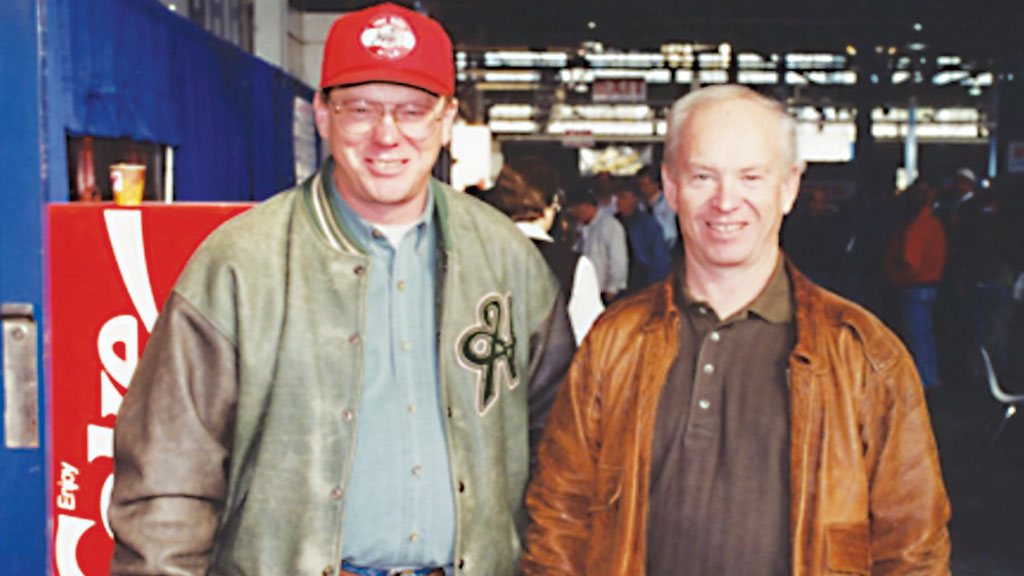
“After he graduated high school, Bob didn’t know what he wanted to do. Photography was one of his passions. I was training horses for one of the editors at the London Free Press. Bob talked to him extensively and almost went to work for the newspaper as a photographer. He really wrestled with it.”
Bob, working by his brother’s side, in Doug’s stable, had a big decision to make.
Ultimately, he chose photo finishes over photography.
“One day, while he was working for me, he just said, ‘You know what? I like photography, but I like horses way better’. So, he worked for me, I think for seven years. He started as a groom, and then was second trainer for maybe four or five years. He did a hell of a job. We didn’t have a Grand Circuit stable at that time, just a nice raceway stable with a couple of good horses. We had horses racing in the Ohio stakes and in Montreal, and Bob would go and take care of them. He loved it.”
It was the luck of the draw, literally, that actually put Bob on the road to Standardbred greatness.
“When my father passed away he had three yearling fillies. My mother said the fair thing to do was draw straws, and each of us, Bob, our sister, and myself, would get a filly. Bob drew J W Barbara [a pacing daughter of Keystone Journal who would win 23 races and earn $103,400] and that was the horse who launched his career.”
Doug, who trained 975 career winners, including the 2000 Hambletonian winner Yankee Paco, and recorded 652 driving victories, is grateful that a life in racing eventually came into focus for his brother.
“He was just a natural horseman from a very young age… but he was also a great photographer right up until he passed away. Bob had nice photography equipment and always took great pictures. I remember years ago, he helped out at The Red Mile one time, taking pictures. He had a very artistic eye.”
And a winning touch.
RANDY WAPLES…
It has been said, time and again, ‘Never meet your heroes’. Randy Waples would respectfully disagree with that notion.
The driver who would win 6,646 races, including numerous high-profile victories and three O’Brien Awards, fondly recalled the day he was warming up a horse over the Greenwood Racetrack oval.
Until a certain moment, it was a non-descript occasion for the 14-year-old, a wide-eyed teenager with aspirations of becoming a top reinsman.
Then he heard approaching hoofsteps from behind, followed by a friendly voice.
“The very first time I met Bob McIntosh was that day at Greenwood,” remembered Waples. “I was warming up a horse for my dad [hall of fame great Ron Waples] and Bob came up alongside me while he was warming one of his up. He just started talking to me. ‘How is your dad? How are you?’
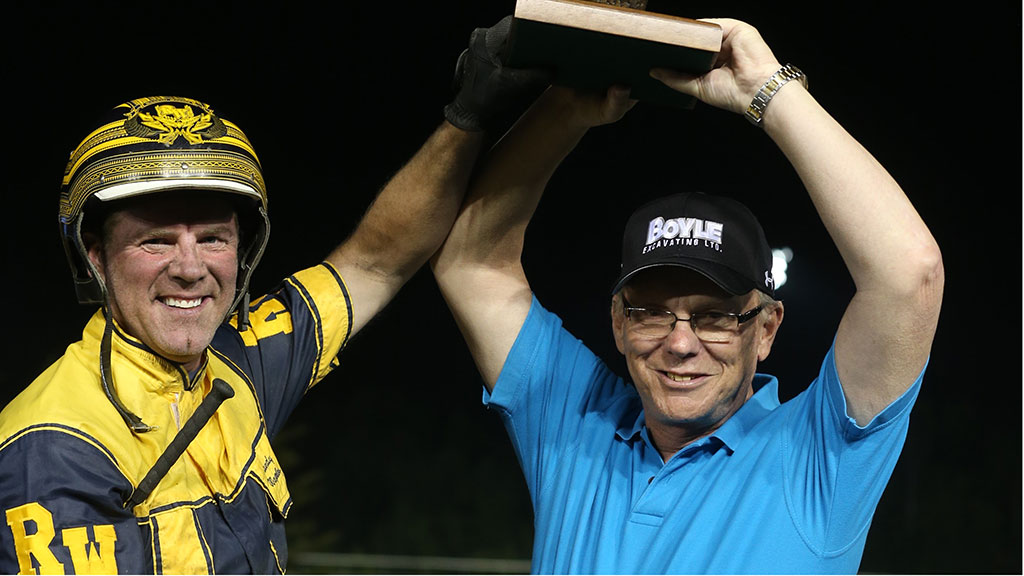
(New Image Media)
“He just talked to me as if I was a regular guy. Here he is, one of my heroes, just having a nice conversation.”
Waples would have many more with McIntosh in the years to come, when they formed one of the top driver-trainer combinations in the sport.
“I drove top-call in his barn for over 10 years. As a driver, I didn’t have big success until I was in my 30s. Two of my driving heroes growing up were Bill Gale and Steve Condren, who both drove for Bob. He always used a certain type of driver, one that could get the job done, but also look after the horse at the same time. When you were brought into that loop and drove for Bob for an extended period of time, it made you feel better as a driver.
“When I started to become somewhat of a successful driver, Bob and I had only teamed up sporadically to do some good things. It wasn’t until around 2007 when I started driving full time for him. It went from, ‘Hi, Mr. McIntosh,’ to having the opportunity to talk with him on the phone regularly. That was the best - talking to Bob about horses. All those opportunities I had to talk to him on the phone about one of his horses, or pick his brain about his horse, it was amazing. I can honestly say I have never been around any trainer who had a deeper knowledge of horses than Bob. He is the bar as far as I’m concerned.”
And very much the definition of a good-guy hero.
“When I grew up, all I heard about was Bob McIntosh. There are a lot of stories, so I don’t know how I would file them down. For me, the biggest thing was how I felt about Bob when I was growing up. There has been so much written about the relationship that we had, but it was from before that, the way I felt about him when I was younger, that is so meaningful to me. He was one of my heroes - simple as that.
“I can’t believe I won’t hear his voice anymore. But thankfully, I have a lot of great memories to look back on. I got to be the top driver in Canada for the guy, and it was the ride of a lifetime.”
JIMMY STOCKER…
Every day, for nearly 35 years, Jim Stocker would marvel at how the man in charge treated both horse and human.
From the first moment the young man walked into the Bob McIntosh Stable, he could tell the trainer had a certain, unmistakable aura.
“Bob always gave every horse a chance, regardless of what level they raced at,” recalls Stocker. “He treated them all so well. He cared for them and wanted to bring out the best in them. He treated his staff with the same respect. He was a very loyal person and people were very loyal to him in return.”
Stocker, who would go on to hold the reins as assistant trainer to McIntosh, had a front-row seat for a high-level harness education, working for one of the sport’s top conditioners for over three decades.
Advice and lessons learned from McIntosh were plentiful.
“He told me that if I kept my eyes and ears open, I would learn something new every day.”
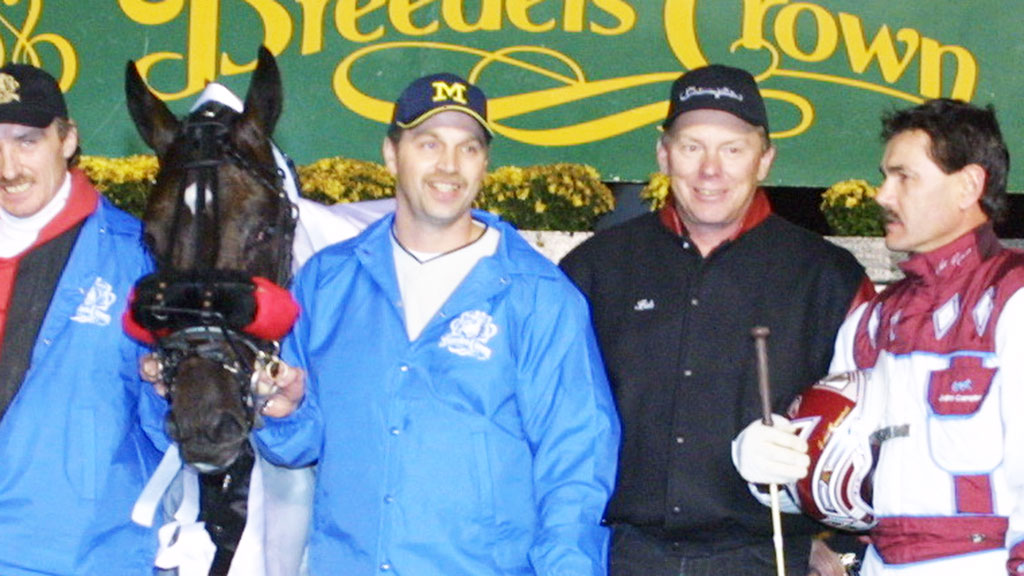
Bob stands between Jimmy Stocker and John Campbell: Western Shooter - 2001 Breeders Crown
Stocker, who had the opportunity to work with legendary stars such as Camluck, Staying Together and Artsplace during his days with McIntosh, heeded those wise words and many others from his hard-working boss.
He also appreciated McIntosh’s management style, so to speak.
“Bob never put pressure on you or looked over your shoulder. He trusted you and let you do your job, but if there was something you felt needed his attention, he would come over and check it out right away.
“You felt valued. He trusted us to go on the road with the horses and take care of them.”
On some occasions, it was the ultimate horse racing roadshow.
“We went to Kentucky every year, and everybody came to see the Bob McIntosh Stable,” Jimmy says with great pride in his voice to this day. “Bob would shake everyone’s hand who would come over to say hello and see the horses. He had respect for others, and they respected him right back.”
Stocker, who is married to trainer Rheal Bourgeois’ daughter, Nicole, received a card and a gift from the trainer and his wife, Patty, when he moved on, amicably, after marrying and relocating. Jim, who now works for Anthony Beaton, where he cares for star pacer Legendary Hanover, learned from and worked for McIntosh for 34 years.
The words found on the card expressed great gratitude for the time they worked together, and the countless wonderful memories they shared. It’s a treasured remembrance of how the high-profile horseman always viewed his staff - as family.
“I don’t know if it has really hit me yet,” said Stocker, of McIntosh’s passing. “But I will always remember Bob as a great trainer and a great person.”
This feature originally appeared in the September issue of TROT Magazine. Subscribe to TROT today by clicking the banner below.


